I Survived the Pulse Nightclub Shooting. How I'm Honoring My Late Friend's Memory 8 Years Later (Exclusive)
"I replay the moments that led up to us being at Pulse almost every day," recalls survivor and activist Brandon Wolf
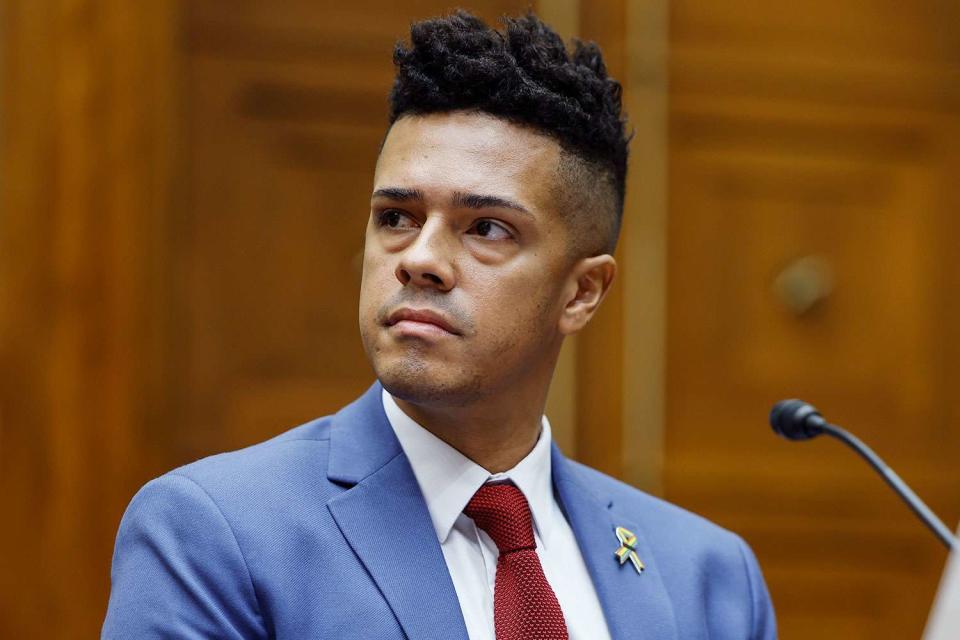
Anna Moneymaker/Getty
Brandon Wolf, a survivor of the Pulse nightclub shooting, at a House Oversight Committee hearing on Dec. 14, 2022, in Washington, D.C.For Brandon Wolf, the early morning hours of June 12, 2016, initially saw him hanging out with his two close friends, Drew Leinonen and his partner Juan Guerrero, at the popular gay nightclub Pulse in Orlando, Florida. However, his life and the lives of the club’s patrons and their loved ones were forever changed when a man armed with a semi-automatic rifle and pistol entered the venue and began shooting. When the carnage ended, 49 people were killed and 53 people were wounded before the gunman's death. During those moments of sheer terror, Wolf, then 27, and several other people hid in a Pulse restroom. He survived, but his friends did not.
In the aftermath of what is regarded as the deadliest attack on LGBTQ+ people in American history, Wolf dedicated himself to activism, especially for Leinonen, who was passionate about creating safe spaces for queer people Over the years, Wolf addressed two congressional committees on those issues and served as a national surrogate for Massachusetts Sen. Elizabeth Warren’s presidential bid in 2019. He now works at Human Rights Campaign and last year, he published his memoir, A Place for Us.
On the eve of the eighth anniversary of the tragic shooting, Wolf, now 35, recalls what happened that day and how it galvanized his social justice work, in his own words, as told to PEOPLE's David Chiu.
It's already hard to be queer and Black in America, and that is especially true when you live in a place where people don't look a lot like you and don't love a lot like you. When I graduated high school in Canby, Oregon, there were just shy of 2,000 students in our school. Of those 2,000 students, 11 were Black, and there was an even smaller number of students who were openly members of the LGBTQ community. So you can imagine it was challenging to find ways to belong. I frequently tell people that I felt like a stranger who'd overstayed his welcome in his hometown.
I was in college working at a Starbucks store near campus when my shift supervisor came into the back room one day holding a copy of the school newspaper. On it was an ad that said, "Help Wanted, Walt Disney World," and a light bulb went off. I thought, "If there's anywhere on earth I can be very gay, it's probably Walt Disney World." I called my grandmother and said, "I've got a great idea. I'm going to drop out of college and move to Orlando to dance for Walt Disney World." She asked me, "How much do you need and when do you leave?"
I auditioned for Disney a couple of weeks after that, got offered a job and moved 3,500 miles away to a place I'd never been to before. In coming to Orlando, I discovered a community that looked a little bit more like me, that loved a little bit more like me. And in no time I discovered that sense of safety and belonging that had long been elusive to me in my hometown.
I had been to Pulse dozens, if not hundreds, of times before the tragedy happened. It's one of the first nightclubs I went to as an out-gay adult. I tell people often that it's one of the first places I held hands with someone I had a crush on without looking over my shoulder first.
We often refer to June 11, 2016, as the last normal day. When it came time to decide what to do on a Saturday night, I texted Drew and Juan and asked if they wanted to get a drink. They got to my place just before midnight. We listened to the same playlist we always listened to, watched creepy '80s music videos, a Drew ritual on going out nights. We made drinks around the kitchen island. We laughed. We told jokes. And we went to our neighborhood bar, our safe space, Pulse.
One memory is particularly vivid. We had a favorite spot on Pulse’s patio, half underneath this awning and half underneath the stars. And Drew, who had a master's degree in clinical psychology, would offer you a free therapy session whether you wanted it or not. That night he had a therapy session for us. He talked about love, friends and compassion. He was irritated that we let the little things get in the way of how much we care about each other. That night he draped an arm over my shoulder and he said, "I guess what I'm saying is I wish we said, 'I love you' more, often."
Never miss a story — sign up for PEOPLE's free daily newsletter to stay up-to-date on the best of what PEOPLE has to offer, from celebrity news to compelling human interest stories.
Just after 2 a.m., I stepped into the bathroom. Drew and Juan were going to have one last dance, and then we would call an Uber and go home. I can remember, for some reason, the poster on the wall above the urinal – a promo for an upcoming show. I remember this cup sitting on the edge of the sink, looking like it might tumble to the floor. I remember vividly how cold the water was from the faucet that night. And of course, I can never forget the first sound of gunshots. At first, I wondered if it might be part of the music. But it was when a dozen or so people rushed into the bathroom with the looks on their faces like they had seen death itself, that I understood that that was not part of the music.
Related: I Survived a Whale Attack That Left My Family Stranded in the Ocean for 38 Days (Exclusive)
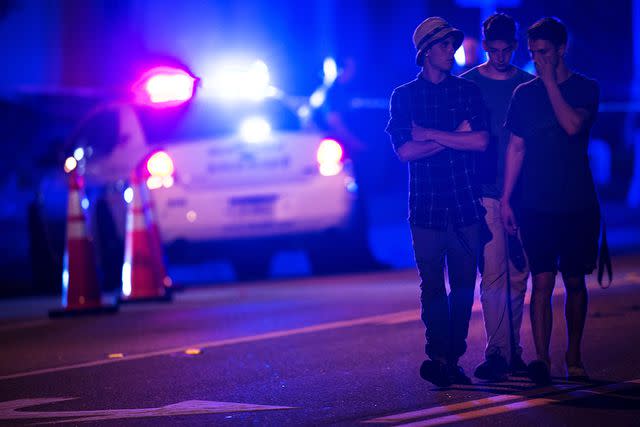
Brendan Smialowski/AFP/Getty
People walk by a police roadblock near the Pulse nightclub on June 12, 2016, in Orlando, Florida.We were only in the bathroom for a few minutes. There was this debate about whether we should run or hide, and the realization that we were in a men's only restroom. There were no stalls, no walls, just us, a hallway and the sound of an assault rifle. I remember vividly the smell of blood and smoke that started to waft into the bathroom, and the girl behind me trying so hard not to scream that I could feel her vibrating on the tile underneath us.
Then I remember the decision to make a break for it, locking arms with these people, sprinting through the dark room in the club. The fog machine smoke was still billowing under our feet. I could feel the bass from the music radiating in the floorboards. There was a relentless “bang! bang! bang!” from an assault rifle coming from the dance floor.
In one moment I was staring at the sliver of light in the back of the room from a door I did not know existed until that moment, really wishing I got a chance to say goodbye to my parents because there's so much I wanted to say to them in that moment.
Then this group and I barreled out of that door into the parking lot, the bright lights from street lamps were glowing. You could hear the sound of sirens roaring up, police getting out of their cars heavily armed with bulletproof vests on. It was chaos. There were people screaming and running, but I also remember feeling stunned and relieved that I'd been able to make it out.
Related: I Survived a Fatal Ferry Sinking in the Bahamas. Why I’d Get on the Same Boat Tomorrow
Truth be told, I got a sense right away that [Drew and Juan] weren't going to make it. We were standing on the sidewalk outside the club, and I had the realization that we'd left them inside and tried to go back in. At that point, police were not letting people back into the building. My partner at the time was there holding me back saying, "You can't go inside." It was in that moment on the sidewalk, on my knees, that I knew that I would not see them again.
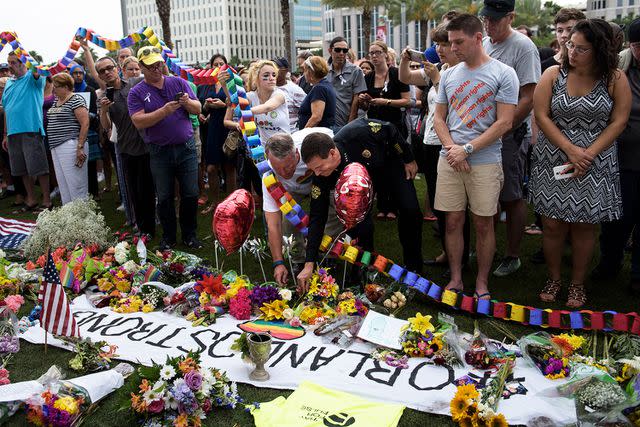
Brendan Smialowski/AFP/Getty
Orlando Mayor Buddy Dyer and John Mina, Orlando Police Chief, place flowers at a memorial before a vigil outside the Dr. Phillips Center for the Performing Arts for the mass shooting victims at the Pulse nightclub June 13, 2016, in Orlando, Florida.In the immediate aftermath of Pulse, I was not convinced that life was worth living anymore. I could not process how to live it without the people who had taught me to be myself unapologetically. And I struggled when I was absorbing the coverage of the tragedy as well, because it felt sanitized. They were talking about Drew and Juan as two more notches in the gun violence belt.
Related: Everything You Need to Know About Pride Month
Six days after the shooting, we had the funeral service for Drew. That became the turning point when I decided that if tomorrow was going to be worth living for, it would have to be in honor of them.
As I helped to push the casket down the aisle that day, I made Drew a promise: I would never stop fighting for a world that he would be proud of.
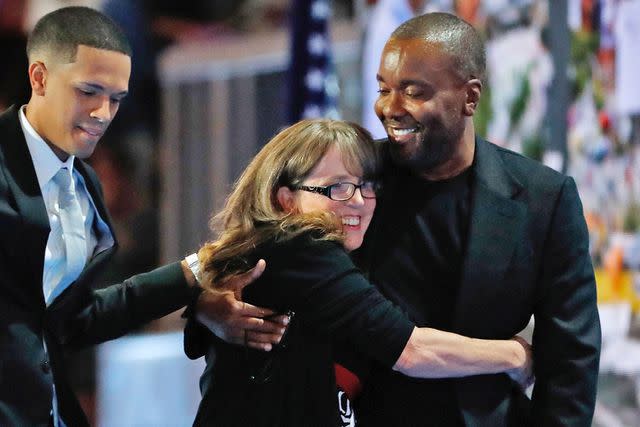
Aaron P. Bernstein/Getty
Christine Leinonen, mother of Christopher 'Dru' Leinonen, is comforted by Brandon Wolf (L), survivor of the attack at the Pulse nightclub in Orlando, and Film and Television Producer Lee Daniels (R) as they walk off stage during the third day of the Democratic National Convention at the Wells Fargo Center, July 27, 2016, in PhiladelphiaWe launched The Dru Project that summer. Our mission was clear from the beginning: we would help to create safe spaces for queer young people, and once they had those safe spaces, we would use them as launching pads to help send them to college and achieve their wildest dreams.
The first time I testified [in front of a congressional committee in 2019] was very nerve-wracking. I wanted to do my best friends justice, I wanted to do the community justice. On the one hand, it left me inspired by those who were there to do the right thing. And on the other hand, it left me determined to replace [the lawmakers] who are not interested in doing their jobs. I think both of those sentiments prepared me for the second time I testified [in 2022]. All in all, I left both of those experiences feeling honored to have been able to represent not just the Pulse-affected community, but affected communities broadly, LGBTQ+, people who've survived gun violence.
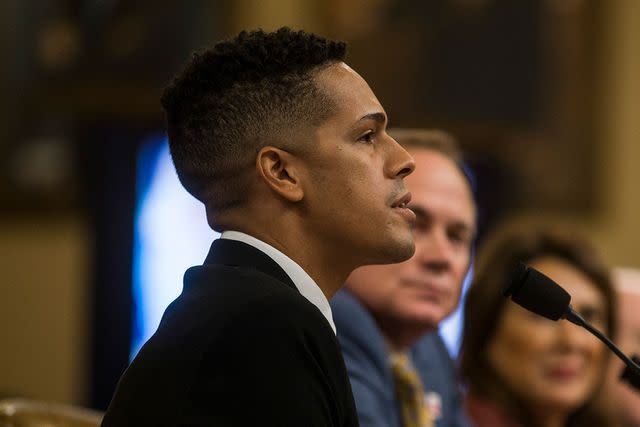
Zach Gibson/Getty
Brandon Wolf testifies during a House Ways and Means Oversight Subcommittee hearing on Sept. 19, 2019, in Washington, D.C..It became clear very early on that if we were going to fight for a world that Drew would be proud of, we were going to have to uproot the root causes of moments like Pulse. We were going to have to change the way people see LGBTQ+ lives across the country, and we were going to have to fundamentally shift the momentum on people's obsession with easy access to firearms.
I think about [the shooting] all the time. I replay the moments that led up to us being at Pulse almost every day. When I close my eyes at night, it's all I can see. It's one of the reasons that I chose to write a book that was so vulnerable and raw, because I wanted to be honest about what it feels like to go through something like that, to have everything you love and know ripped apart in an instant. People who see it from the outside see resilience, strength, finding power and purpose. What they don't see are the nights that you cry yourself to sleep and the days where you wish you could call your best friend and tell them about something incredible that's happening.
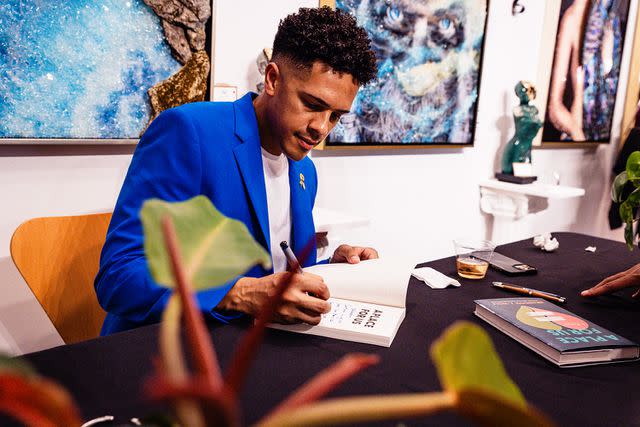
Albert Harris
Brandon Wolf signing his 2023 memoir 'A Place for Us'Finding purpose has definitely been healing for me. I'm also a big proponent of mental health resources. I have a great therapist who's helped guide me through not just survivors guilt, but PTSD and other outcomes from surviving the tragedy. I've got a great chosen family. I've got friends that I knew before, friends that I met through Drew, friends that I made afterward, and I think they helped me to get through the hardest days.
Every year, June 12th is a difficult day because it brings with it the conflicting emotions that come from tragedy and trauma. I am filled with joy remembering the lives of my best friends. Drew in particular would've been 40 this year. He would've celebrated his 40th birthday on June 1st. So I'm filled with joy, thinking about all the beautiful times we had together, and of course, filled with grief because they should be here.
For more People news, make sure to sign up for our newsletter!
Read the original article on People.


